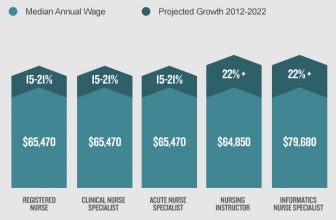
Becoming aware of the available LPN programs is the starting point in your licensed practical nurse career. There are many nursing careers you can choose from. The variety makes a decision hard for you and some professional guidance will go a long way to help you make the right one. The licensed practical nurse would be such a choice that you will never have regrets for the bargain that comes your way. This article will deliver all the information you may need about making a career choice in nursing and answer pertinent questions you may have before making a final decision.
Contents:
- Program Overview
- Program Prerequisites
- LPN Courses for Your Consideration
- Program Accreditation
- Important Things to Remember about Accreditation
- Major Categories Covered in NCLEX
- Advancing Your Education
- Campus Versus Online Programs
- How Long Before You are Qualified
- How Much Does It Cost
- Is This the Right Choice for You
- Your Job Description
- Choosing the Best School
Program Overview

Sometimes you do not have to go for a degree to get your dream career; you can start it small. LPN course is such a career that will not demand from you a bachelor’s degree. You can have a diploma and fly high to become the best in the field.
Unlike most of the other nursing jobs, you will not need a college degree for LNP. You basically need post-secondary training and you are in for the career that you wanted from your childhood age. Once you are qualified, you will be expected to give basic healthcare to patients under the supervision of senior personnel. During training, you are ushered into creative and logic thinking that will help you make appropriate decisions as required of you by Nursing Practice Act. The LPN programs are flexible since you can make a choice to have full time or part time basis depending on what will work for you. You can have your job and only find a few hours to attend class and that is a balance that many professionals would like to have. Once you are qualified, your duties are diversified so you should embrace yourself for what will come your way. After all, this is something you are passionate about.
Program Prerequisites
Vocational schools and community colleges will require some pre-qualifications before you enroll. You are expected to have a high school diploma or any equivalent from your state. In some cases, you will be required to sit for entry exams. For whichever school you are considering, make a point of asking what prerequisites you will need. It varies from one school to another but the most important thing is to ensure that the school is accredited.
LPN Courses for Your Consideration
If you have already made the decision to pursue the practical nursing occupation, you would be asking the kind of courses available for your choices. There are good varieties and here are some of the most acclaimed courses that will start off your calling on flying note:
- Nursing license preparation: this is the final recap of the entire program. It crowns what you have studied and tests whether you are ready to practice it in real-life situations.
- Introduction to client-care module: you are now introduced to the care given to patients before and after surgical processes. You will get an intensive introduction to pharmacology, anatomy, physiology and nutrition all of which are important to recuperating patients. This is a basic foundation to the generalized care that will be expected once you are done with training.
- Advanced client care: mental care, obstetrics, and pediatrics are all covered in this course. It adds to the foundation you have already set with the introductory courses. It helps you with future knowledge when it comes to handling critical cases.
- Client care with I and II: it is time you get a taste of what goes on in the clinical work. You will learn about various interventions in conditions that you will face in the future. It provides in-depth knowledge on how to handle patients even in their worst situations and deliver excellent results.
Program Accreditation
There is one thing that you will find with all healthcare careers: they should be accredited before they are considered to be befitting. Same way, LPN courses should undergo accreditation which is done by designated bodies. Accreditation is essential since it ensures that you meet all the state, national or even international standards to be entrusted with the lives of human beings. So, what are the main LPN accrediting bodies?

- The Commission of Collegiate Nursing Education (CCNE): if you are persistent enough to go to the bachelor’s or master’s level, this is the body that will accredit your practice. It does an advanced review of what you studied before deeming it fit that the courses you have learned are adequate to be taken to the ground.
- The Accreditation Commission for Education in Nursing (ACEN): This is the body which generally accredits all the nursing courses. It does this to all levels from diploma to Ph.D.
Important Things to Remember about Accreditation
There are state boards that approve programs so as to prepare students for the National Council Licensure Examination (NCLEX). However, such accreditation is not automatically what equates school approval by the national organizations. It is thus always advisable to check before you apply for a school.
Sometimes you may be willing to take the risk to go for state approved but non-accredited schools. Well, this may be the only option in your situation but it comes with its own drawbacks. Yes, you will be able to take the NCLEX but your career will be stalled if you are planning to continue with your education. The overall risk is that you will not be qualified to attend accredited schools for additional education and you will remain with the qualification you already have.
Major Categories Covered in NCLEX
The final examination emphasizes on what you have been doing for the entire training. It covers 4 major categories that are core to your success once you are in the field and practicing. These categories include:
- Integrity in physiology: this tackles general comfort of patients in their varied conditions. It handles all the key areas that ensure clients/patients are safe within and without health facilities.
- Health maintenance and promotion: early detection and diagnosis of diseases and conditions is what is given priority here. It ensures that prevention is sustained and only on inevitable situations does it come to healing.
- Psychological integrity: some situations will require that patients be psychologically comforted. This is not a directly medical practice but it supports the prevention and healing processes.

Advancing Your Education
Good news with LPN is that you can grow both your education and career. You can become a registered nurse (RN) and here are the 2 available gateways for you:
- Bachelor’s degree programs: as an LPN, you can enroll for this degree and be on your way to becoming RN. This program is focused on nursing concepts and leadership skills that are needed once you become a fully pledged nurse. It will take you 3 years and if you are on a job you may never notice how fast time flies.
- Associate degree programs: generally, it will take you 2-3 years to complete the associate degree. However, with LPN qualification the completion duration becomes even shorter. You will get indulged into anatomy, chemistry, nutrition, and microbiology.
Campus Versus Online Programs

Flexibility is one thing that modern education has considered. Long time ago, you would not study away from a typical classroom but today that is possible. For your Licensed nurse training, you can choose whether to attend a physical or online class. If you have the time, you could choose to go at the campus. This is an option that works best if you do not want to work and study. The online option is for those who may not have the time to attend physical classes due to other engagements like job or family commitments.
How Long Before You are Qualified
If you are worried about taking long time studying, you should stop. Generally, it will take you one year to complete your training. There are some that will even take as less as 7 months. On the longer side, advanced programs will take 24 months.
How Much Does It Cost
The financial burden is what will make you not to take a training program that you have always wanted. But with LPN, you do not need such a huge budget that will break your bank account. The tuition asking fee usually begins at $ 2,000. This is something you can save for easily and enroll once you get the lump sum. Depending on the payment arrangement, you could be paying bit by bit until you are done. The other expenses come down to the kind of lifestyle you lead as a person thus you can cut it down to an insignificant figure. If you are working, you will not feel the financial burden.
Is This the Right Choice for You

Before you make a final decision, you would like to know whether this is the kind of course/job that you would want to pursue for the rest of your life. Licensed nursing is a good career that may start in a small way but you have a great opening to your future career. Recent studies show that the nursing industry will create 25% of new jobs in the next decade. Therefore, there is a promise for a job and you may not stay for long before you land your first job. Here are the advantages that will come your way once you choose this career path:
- You do not need a degree to enroll or to get a job. Your post-secondary diploma is adequate to start you off.
- You have the chance to advance and become a registered nurse. And you can do this once you get a job since there is the option for part-time lessons.
- As it has been shown by credible studies, nursing jobs are on the rise. You will not search a job for long since openings are frequent and you can make the best choice.
- There are multiple accredited schools at the state and national level. You just have to make a pick of your favorite school that meets your preferences such as courses, payment, and other attractive offers.

Your Job Description
It would be right to say that, as an LPN practitioner, your job description is wide and diversified. But to introduce you to what you expect in your normal day, here are some of the duties and roles that will be regular on your working table:
- Monitoring patients: it is in your line of duty to monitor how patients are doing. They need to be making improvements on their conditions and it is on your part to ensure that they are fine.
- Providing comfort: patients may find themselves in pain or panic. It is your duty as an LPN to ensure that this does not get out of control. You have to comfort them even in the direst condition.
- Data collection: in order to keep track on patients’ progress, data is needed. It is in your docket to collect crucial information which is useful in making right diagnosis and prescribing medication.
- Improving patient’s personal hygiene: good hygiene is part of ensuring healthy practices. You are to ensure that patients take care of their health so as to improve their condition.
- Promote safety at all times: it is of utmost importance that patients and nursing practitioners are safe at all times. Your basic care qualification requires you to be on the forefront to ensure safety practices.
Choosing the Best School
The kind of school you will attend is the first stepping stone to your career. There are good schools around but you have to perform a critical analysis to find the best that will suit your needs. A good school will have the following:
- Modern facilities: lab equipment and other learning paraphernalia are important to your studies. They help you get practical lessons that will come in handy once you are in the profession.
- Accredited programs: not every other program will be suitable to your qualification. Schools that have all their programs certified are the best for your consideration.
- Experienced teaching professional: the teaching staff should be qualified to give you the best experience and knowledge. With good tutors, you have an edge over other competitors.
- History in good performance: the past of a school will tell you much of their success culture. Choose a school that has had years of successful runs.
You now have all that you would have wished to know about LPN programs plus the bonus on what is expected once you are in the field. Go ahead with your plans and be in a career that has been in your heart for all these years. Best of luck as you pursue your licensed practical vocation.
























































































































































